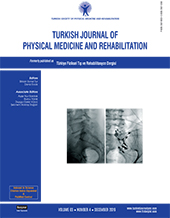The course of post-stroke bladder problems and their relation with functional and mental status and quality of life: A six-month, prospective, multicenter study
2 Department of Physical Medicine and Rehabilitation, Pamukkale University Faculty of Medicine, Denizli, Turkey
3 Department of Physical Medicine and Rehabilitation, Istanbul Physical Medicine and Rehabilitation Teaching and Research Hospital, Istanbul, Turkey
4 Department of Physical Medicine and Rehabilitation, University of Health Sciences, Ankara Physical Medicine and Rehabilitation Training and Research Hospital, Ankara, Turkey
5 Department of Neurology, Ege University Faculty of Medicine, Izmir, Turkey
6 Department of Physical Medicine and Rehabilitation, Ankara Yeni Vizyon Health Center, Ankara, Turkey DOI : 10.5606/tftrd.2019.3205 Objectives: The aim of this study was to evaluate the frequency and course of post-stroke lower urinary tract dysfunction (LUTD) from early term up to a period of six months and to investigate the relation of LUTD with functional and mental status and quality of life (QoL) in stroke patients.
Patients and methods: This prospective study included a total of 70 stroke patients (44 males, 26 females; mean age 62.7±7.0 years; range, 46 to 79 years) from five different centers across Turkey between June 2015 and January 2017. The patients were questioned using the Danish Prostatic Symptom Score (DAN-PSS) to evaluate LUTD and evaluated using the Modified Barthel Index (MBI), Incontinence QoL Questionnaire (I-QOL), and Mini-Mental State Examination (MMSE) at one, three, and six months.
Results: At least one symptom of LUTD was observed in 64 (91.4%), 58 (82.9%), and 56 (80%) of the patients according to the DAN-PSS at one, three, and six months, respectively. A statistically significant improvement was found in the DAN-PSS, MBI, MMSE, I-QOL total scores, avoidance and psychosocial subgroup scores at six months compared to the first month scores (p<0.05). There was a significant negative correlation between the DAN-PSS symptom score at one month and the MBI, MMSE, and QoL scores at six months. The DAN-PSS bother and total scores were found to be significantly and negatively correlated only with the subscales of the QoL questionnaire.
Conclusion: Based on our study results, LUTD was very common and the prevalence of LUTD findings decreased constantly during six-month follow-up, showing an association with a poor cognitive and functional status and QoL in stroke patients with LUTD.
Anahtar Kelimeler : Danish prostatic symptom score, incontinence, lower urinary tract dysfunction, stroke

















